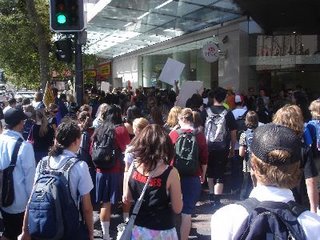Auckland University’s Dirty Laundry

Auckland University’s Dirty Laundry
How much do you think one of Auckland University’s cleaners is paid? Take a guess. Then ask yourself, how much is a living wage in Auckland? A lot more than the $10.95 (70 cents above the minimum wage) most of the cleaners at Auckland University are paid that’s for sure.
The University of Auckland contracts it’s cleaning work to three large multi-national corporations. Spotless, the largest cleaning company in Aotearoa makes multi-million dollar profits and although the Spotless cleaners on campus, some of whom have worked here for eight years, have petitioned for decent hourly rates Spotless ignores them and continues to pay them at $10.95 including people who have been cleaning on campus for years. If you've ever tried living on $10.95, now think about trying to pay the rent, feed your kids and fund your petrol and upkeep on a car (which you will need to get to and from the CBD from Otara or Mangere to do your job). Now think about the debt you'll be in when you have to take a high interest loan to cover your bills... sound fair to you?
Spotless workers work between 11pm and 7am so the chances are that you have never seen them. On the other hand you will have seen their coworkers in Fresh and Clean who work between 6am and 3:30pm. Cleaners who work for Fresh And Clean are paid slightly more than those who work for Spotless. Some of the cleaners who work with Fresh and Clean then head down to the city at 3:30pm to start their secondary jobs cleaning the CBD offices blocks at 5pm. So after they finish their eight hour shift at Auckland University they head down to start another long shift because the university administration allows it’s contractors to get away with paying poverty wages. The third cleaning company is City Cleaning which pays it’s workers $10.95 as well.
Cleaning isn’t easy, as anyone who has done it will tell you. Campus cleaners work extremely hard and the work is difficult to fit into the hours they are paid for; many end up doing extra unpaid work to finish their floor quotas. Unrealistic work rates are a big problem in the cleaning industry because every time a contract changes, the company who wins the tender usually wins because they offer to do it for less than the existing contractor. This means that fewer cleaners are employed and fewer hours are given to fulfill the same contract.
The contracts change pretty regularly so it's a race to the bottom in the cleaning industry and it's the cleaners who bear the brunt of this. In Australia cleaners mostly earn between $17 and $20 per hour. If you compare this to what cleaners get paid in Auckland then you understand why this really is the university’s dirty laundry.
“My socks have holes in them. That's because I have to buy my socks from the second hand shop. I can't even afford the two-dollar socks from K-Mart," said Sue Lafaele, an Auckland cleaner. Sue asks, "Cleaners need respect for our work and to be paid a living wage - why shouldn't I be able to buy new socks like everyone else?"
The union representing the low paid, predominantly Pacific Island and Maori cleaning workforce is campaigning to change the cleaning industry. They need student support and solidarity. The campaign is a simple matter of social justice. If you work for 40 hours you should be able to afford to live. Cleaners want decent jobs, decent hourly rates and recognition of their experience and skills. Most of all they want respect for their work and for their lives, and an hourly rate that recognises their hard work.
There are three ways you can support cleaners on and off campus in their struggle for wage justice.
- This one is really easy. Come to the Anti Poverty Day rally cleaners are organising - it's on Tuesday October 17th at 5pm. March up the street with cleaners and other low paid workers coming in to support their call for an end to poverty wages in New Zealand.
- Tell the cleaners you support their campaign for better jobs and better pay - tell them they deserve it. It's a tough job. They appreciate your support.
- Sign the petition calling on cleaning firms to be responsible contractors - to treat their workers with respect. A copy is available at the AUSA reception for people to sign.
The cleaner’s Clean Start: Fair Deal for Cleaners is a global campaign working to make sure cleaners get respected for their work. Be a part of it and help us clean up this dirty industry. On the net: www.sfwu.org.nz
Published in Craccum 16/10/06
Labels: workers and unions



